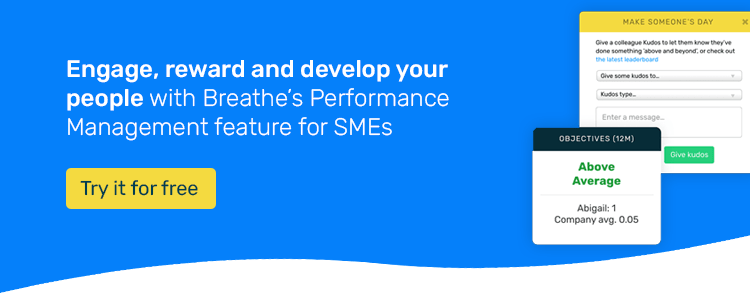Rewarding your employees is about more than giving them a warm glow inside.
A well thought-through employee rewards scheme is essential for SMEs who want to succeed. It helps them get the best out of their staff, build a strong company culture and drive their business forward.

In this article, we'll be exploring:
- What employee reward schemes are
- How company reward schemes work
- The benefits of employee rewards
- Types of reward schemes for employees
What is an employee reward scheme?
An employee reward scheme is a formalised way of rewarding your employees for their efforts.
While you don’t have to formalise your approach to reward and recognition, doing so makes performance management easier by setting clear expectations about what will rewarded.
More than that, an employee reward programme gives everyone a chance for recognition and promote equality in your organisation.
Your reward scheme will encourage productivity and motivate your team if created thoughtfully and used well.
How do company reward schemes work?
The best company reward schemes work when you align them with your broader business plan. They send a clear message that you recognise your employee’s efforts throughout the year.
Set up your scheme by integrating it into your overall strategy and basing it on simple yet meaningful criteria.
Your scheme could recognise efforts that are:
- Timely
- Frequent
- Specific
- Visible
- Inclusive
- Values-based
It’s common to link rewards to personal objectives, length of service, innovative thinking and displaying company values.
But remember - hard goals aren’t the only things worthy of reward. Setting up a new wellbeing scheme or smoothing out tension in a team won’t show in the balance sheet, but will you put your people first and keep your staff engaged with the business.
Showing appreciation throughout the year is important too. Whilst you may need to wait until the end of the quarter or financial year to give a bonus, saying "thank you" for a job well done goes a long way and shows how much you value your team.
Discover Breathe's performance management tool
5 ways employee rewards schemes benefit SMEs
Rewarding & recognising your employees is such an important tool in your HR toolkit. Here’s how it can benefit your SME.
Boost employee morale
At our simplest, we humans are social beasts. The swell of pride we get when we’re told we’re doing a good job makes us feel appreciated.
Recognise regularly and you’ll boost employee motivation and improve overall morale.
Reinforce your culture
Your reward scheme shapes your company culture. Do you encourage everyone to show recognition, or is that just down to the managers?
Think about the kind of rewards you give, too. Do you give big bonuses, go to the pub together or do you prefer to reward your employees with time off to spend with their families?
Each type of reward attracts and delights different kinds of people – so be sure that your mechanisms are in line with your broader company position.
Your business will be more productive
Integrating a successful employee reward scheme into your business boosts business productivity. That’s because you’re not only rewarding the behaviour you want to see more of, but you’re increasing employee focus.
In fact, Glassdoor ran a study that found that 81% of employees said they’d work harder for a more appreciative boss, compared to only 38% of employees working harder just because their boss demands them to.
You’ll boost retention rates
Think a rewards scheme won’t impact retention? You might be surprised.
One study found that 66% of employees said they’d leave their job if they didn’t feel appreciated. That’s quite a number.
Another study of 1700 respondents backs this up – with 69% of employees ranking recognition and rewards as being important factors in whether or not they stayed with their current employer.
You’ll see better teamwork
Depending on the way you set up your reward scheme, you can boost the teamwork in your SME.
People like to be part of successful teams and feel a buzz if they’re recognised as such.
What’s more, it’s known that by doing something good for others – which could be as simple as showing appreciation – the person doing the good gets a rush too. It’s win-win.
Types of employee rewards schemes
Think you need deep pockets to put an employee rewards scheme into place? Think again.
Non-cash rewards
A study at Northwester University showed that “that non-cash rewards programs would work better than cash in such cases as reinforcing organisational values and cultures, improving teamwork, increasing customer satisfaction and motivating specific behaviours among other programs."
Variable pay and bonuses
As with so many things, you need to take your overall business strategy into account. Money is important to employees, so if you can include bonuses and variable pay options, your employees will appreciate this.
Or, you could think about share options. These reward employees with less impact on your immediate cashflow. What’s more, share schemes give your employees a greater incentive to work hard over the long term.
Small things matter
But don’t discount the value of written or verbal praise and team recognition, such as 'team-player of the week'. If anything, these small acts of recognition show you are invested in the work your team does. A handwritten thank-you note or a Friday afternoon off work may well do more for employee motivation than a lavish all-expenses-paid lunch.
Remember, rewards don’t need to be big. Mostly, it’s the appreciation that counts. After all, who wouldn’t smile at the thought of an unexpected, fully-paid Friday afternoon off?

Author: Laura Sands
Laura is a writer who enjoys getting into the detail of subjects and sharing that knowledge with snappy, interesting content. When not typing away, she enjoys walks in the woods and curling up with a good book and mug of something hot.




